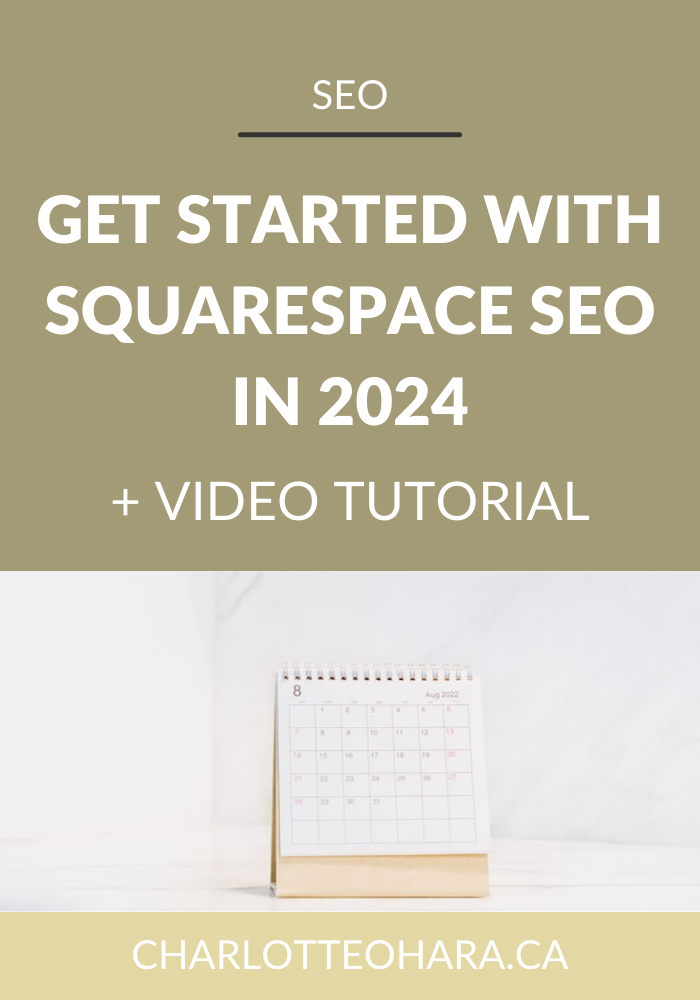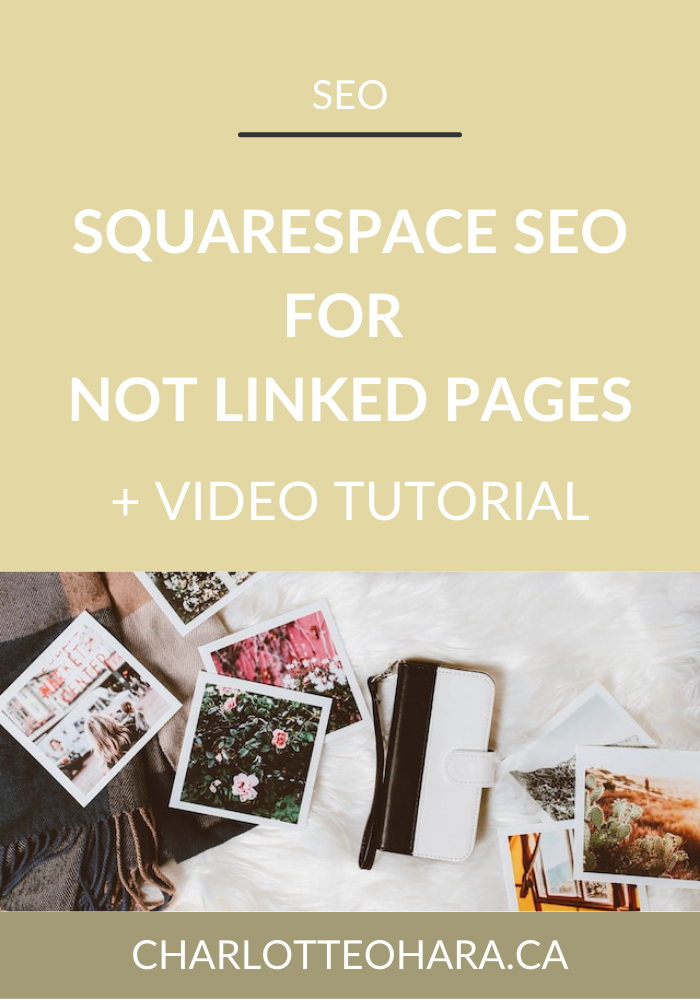Here’s why you should avoid keyword stuffing if you want to master Squarespace SEO
Everything you need to know about keyword stuffing and Squarespace SEO
Ahhhh, keyword stuffing.
As a web designer and Squarespace SEO expert, I see so many website and small business owners making this mistake without realizing that they’re even doing something wrong, and it makes me weep for them.
Look, I get it.
Most websites act as an online “home” for a business, they’re basically a digital presence and a way to share information about products/services/offerings. SEO can take things to the next level but it can also be confusing as heck, especially if you’re a newbie or not technically inclined. In so many cases, the person who built or runs the website probably isn’t an expert. They’re figuring things out as they go, trying to learn and implement whatever they can to improve their website and reach more of their ideal audience.
SEO is hugely valuable because it’s basically free marketing, but that doesn’t mean that it’s easy to master!
Keywords are a key pillar to SEO but they can be hard to understand, let alone use and incorporate effectively on a website.
That’s why I’m so keen to share this post and video tutorial with you today so that you can learn all about keyword stuffing and avoid it like the SEO killer that it is.
If the whole concept of keywords is totally new to you or you are still confused by it, please read this blog post first and then meet us back here when you’re ready:
Remember that SEO is an art, not a science. There’s so much to learn about Squarespace SEO which is why I have written about it a lot - it’s the most popular topic on my blog by far. Check out my Squarespace SEO page for more resources, blog posts & video tutorials and get your copy of my Squarespace SEO Checklist below for free!
SQUARESPACE SEO SERIES
This article is part of my series on Squarespace SEO. I have so many tips to share on the subject that it would have been crazy to put it all in one article! There are many misconceptions about Squarespace SEO which is why I've dedicate so many posts to this topic. Enjoy!
Click to view all posts in the Squarespace SEO Series
Visit my Squarespace SEO page for lots more resources.
Keywords are an integral part of any Squarespace website’s SEO strategy and I’m super excited to explain keyword stuffing to you today. After you’ve read this post, I hope that you will tweak your website as needed and avoid keyword stuffing from here on out. And maybe pass this post along to a friend who’s committing this SEO cardinal sin? Help a brother/sister out!
Alright, that’s enough intro for one blog post :)
Let’s get into it.
What is keyword stuffing?
Keywords are essentially words or phrases that identify a certain topic. They’re used on websites in many different places, including titles, headers, body text, image names and descriptions, etc. Again, read this post if you need a refresher on keywords.
Keyword stuffing is the practice of including or repeating a keyword (or multiple keywords) on a page as many times as physically possible.
Here’s what Google has to say about keyword stuffing aka irrelevant keywords:
“"Keyword stuffing" refers to the practice of loading a webpage with keywords or numbers in an attempt to manipulate a site's ranking in Google search results. Often these keywords appear in a list or group, or out of context (not as natural prose). Filling pages with keywords or numbers results in a negative user experience, and can harm your site's ranking. Focus on creating useful, information-rich content that uses keywords appropriately and in context.” - Source
Back in the day when search engines were in their early stages and Google was still a work in progress, you could manipulate a page’s ranking on Google’s SERP through keyword stuffing fairly easily.
This meant that websites could rank highly in search results for a large variety of keywords simply by cluttering and stuffing the keywords into web pages or blog posts. Some people were little sneaks about keyword stuffing and would hide the offending keywords by matching their text colour to the site/page background colour, or other shady tactics. Other people were just shameless and blatantly stuffed the keywords into the website content without a real care in the world.
Luckily, times have changed and those days are mostly behind us. Keyword stuffing is now something that Google and other search engines will penalize you for. Once Google updated their search algorithm to deal with this ridiculous practice and penalize offending websites, it became less and less effective. Nowadays, SEO experts all agree that it is NOT an effective strategy and just because it might have worked back in the day, it definitely will not have the same results if you do it now.
Penalties and consequences for the offenders
If a website participates in keyword stuffing, either intentionally or accidentally, odds are that search engines are going to penalize them for this SEO misstep. Your website will not be ranked as highly in search results which means that you’ll have a much harder time getting in front of your ideal audience online.
This is particularly important for service-based businesses or anyone trying to sell a product/offering. If your website is being penalized with lower rankings because of keyword stuffing on your pages, you are missing out on huge possibility of getting in front of your ideal client/customer/readers.
Another issue that comes up is higher bounce rate. As you might recall, bounce rate is basically when someone finds your site, clicks over to it and then exits out very quickly because they don’t like what they see. A high bounce rate is an indicator of a poor user experience and is another factor that Google will penalize your website for when it comes to SEO. Again, high bounce rate because of keyword stuffing means that you’re missing out on connecting with potential clients/customers who won’t check out the offerings on your website.
Example of keyword stuffing
If this is the first time you’ve ever heard about it, you might be like “wait, Charlotte, what do you mean? Show me!”. Ask and ye shall receive, my friend.
Here’s an example of terrible keyword stuffing:
“On the hunt for a cheap yoga mat? If you’re looking for a cheap yoga mat, you’re in the right place. Our cheap yoga mat online shop is the best place to order your new cheap yoga mat. Feel free to check out our selection of cheap yoga mats from our cheap yoga mat selection in our online shop now.”
Notice how many times the keyword “cheap yoga mat” is repeated in such a short space. That type of website content is just brutal, eh? Seriously, no one wants to read that!
Keyword stuffing and user experience
Keyword stuffing is wild because even if you somehow end up on the first page of search results for a keyword like “cheap yoga mat,” it’s not going to do you any good in the long run. Any searcher who clicks over on to your site is going to read your keyword stuffed text and peace OUT, they’re not going to want to stick around. That type of website content is repellant, a total turn off. They’re not going to read an intro like that and think, “yes, this is exactly the vibe I’m going for, these people totally get me and have my best interest in mind”. Nope, instead they’re going to take one look at that junky keyword stuffed text and exit away from your site asap.
If we want to look at keyword stuffing in other terms, it’s basically an awful user experience. That’s because real humans don’t want to read website copy that contains the same keyword/keyphrase repeated over and over again. It’s not natural language and real people are going to be turned off by it.
As Google and other search engines became more sophisticated and effective, they started filtering out and penalizing keyword-stuffed pages, because these pages and their content weren’t actually helpful to real searchers.
This was a giant step forward for internet users everywhere and had a major impact on SEO!
Avoid keyword stuffing, use keywords responsibly
It’s not all “doom and gloom” on the keyword front, you don’t have to be afraid to use them on your website for fear that Google will penalize you and you’ll never show up in search results!
Thankfully, that’s not how things work.
Aim for quality over quantity, and don’t make density your main goal!
While it’s true that keyword stuffing is a major SEO faux-pas, you will instead be rewarded for including keywords responsibly on your website. It’s still super important that you use keywords in your content, but the goal is to do it in moderation and be natural about it.
When you start writing or editing the content or the copy for your website, think about the real human who is going to be reading it. Yes, that’s right, the living breathing person who is going to be checking out your site. Don’t write with Google’s crawlers and indexers in mind, instead just write naturally with real language. The best strategy is simply to ask yourself if the use and placement of a keyword reads naturally.
You can still create informative, useful, valuable website content that contains your targeted keywords, and best of all you can do it without going overboard and stuffing them in all over the place!
How to use keywords responsibly on your Squarespace website for best SEO
Alright so we’re in agreement that you’re going to write content for your website using natural language with real readers in mind, yippee!
If you’re like “how do I actually do that, Charlotte?”, don’t panic! This is not something you need to overthink or start calculating down to the word.
There’s no real magic number for how many times you can include a keyword in the content before it gets counted as “keyword stuffing”. Some resources that I’ve referenced say you should aim to include the keyword between 2-5% in the content but again, I’m not sure if that’s Google’s official number or anything. So long as you’re being smart about things and are writing in normal, real person way, you should be fine and probably won’t end up keyword stuffing your content.
Keywords will naturally be used in several places on your website so make sure to be aware of how you’re including them across your content and in different settings/fields.
Here’s a list of the key places where it makes sense to use keywords on your website for Squarespace SEO:
SEO title & description fields on each page (info here)
Headers (e.g., on pages, in blog posts, etc.)
Body Content
Link anchor text
Product/event descriptions
As you can see, there’s plenty of room for error BUT there’s also many opportunities to get things right on the keyword front!
Another tip is to use synonyms whenever possible throughout your website content. Not only does this mix things up for your readers, but it also indicates to search engines that you’re being relevant and variant with your keywords.
Here’s an example: the 4th of July, Fourth of July, July 4th, Independence Day, etc.
When you have a variety of related keywords, you’re indicating to search engines that your content was created with value to readers in mind. Google sees that you’re not trying to trick their content crawlers, and they’re going to reward you for that.
Final Thoughts
It’s time to kick keyword stuffing to the curb and I hope you see how it can be a major SEO killer and something you should avoid entirely on your Squarespace website!
It’s an outdated, ineffective strategy that all modern websites should avoid because keyword stuffing can do more harm than good. If you want to improve your SEO and rank higher in search results, you can (and should!) definitely still use keywords on your website - just be sure to be smart about it. Create content that is engaging, provides value to your ideal audience and readers, and is written with natural language that supports a positive user experience. Your audience and potential clients/customers will thank you, trust me!
Do this and Google will take note and reward you, which is the ultimate goal if you want to grow your website and online business.
Now it’s your turn to tell me, have you ever heard about keyword stuffing before? Is it something that you’ve seen on crappy websites? Is it something that you’ve done on your own site, either accidentally or because you didn’t know better? Have I convinced you to audit the content of your website and fix any potential problems? I’d love to know so leave me a note in the comments below!
No matter what type of Squarespace website you have, you should be using keywords strategically. I encourage you to start where you are and work on improving your SEO a little bit at a time, you’ve got this!
If you want more SEO goodness, be sure to check out my Squarespace SEO page for all resources on the topic.
You can also sign up for my newsletter (right here or below), where I often share Squarespace SEO tips, tricks and high-quality exclusive content. I send out emails to my list every week and while I don’t talk about SEO every time, I can guarantee that you’ll still find the newsletter topics interesting, entertaining and worth your time.
Finally, shameless plug : hit me up with any specific questions you have about Squarespace SEO and your website because I’m your girl. You can reach out to me directly if you’re interested in working together on your website and we can talk about whether or not you would be a good fit for my consulting and ongoing services. I can’t take on every request to do SEO consulting but I do pick a few websites and businesses to work with every month and I’d love for you to be one of them.
You may also be interested in:
Top Squarespace SEO - online course details and enrollment
Squarespace SEO for Affiliate Marketing - masterclass
LAUNCH YOUR BEST SITE - FREE ECOURSE
Interested in learning more about what it takes to get a website up and running? Sign up for my free 7 day e-course!










